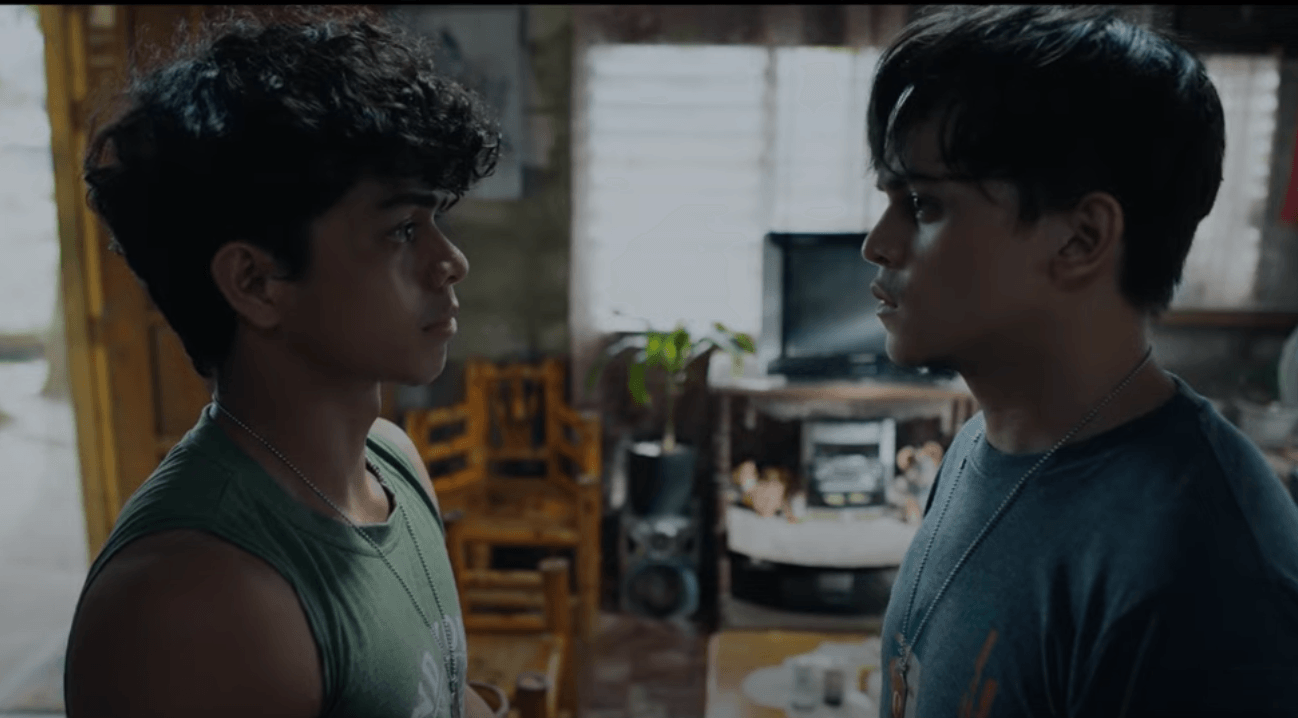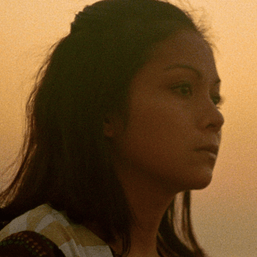SUMMARY
This is AI generated summarization, which may have errors. For context, always refer to the full article.

Spoilers ahead.
MANILA, Philippines – In his essay on Ruben Abalos’s Hayok, a Bomba film released in 1970, Ishmael Bernal notes the use of the phrase “pagnanasang kaibaiba,” which roughly translates to “strange desire,” to illustrate bisexual desire.
It’s a euphemism my mind keeps drifting to as I mull over Jun Lana’s R-18 erotica, Your Mother’s Son, which I read as the director’s elaborate attempt at the Bomba genre, most notable for inducing spectatorial pleasure out of the explicit display of sexual and sexualized bodies – women’s bodies in particular. In this case, though, Lana stretches that desire, minus the bisexuality, into a May-December romance that definitely warrants a stronger adjective than “strange.”

Your Mother’s Son opens the inaugural EnlighTEN: The IdeaFirst Film Festival, marking a decade since the inception of the production company, the brainchild of film producer Percival Intalan and Lana himself. The film is originally titled Anak Ka ng Ina Mo, alluding to Ina Ka ng Anak Mo, a 1979 film by Lino Brocka. Much like the social realist master, Lana is eager to discourse on the grand by situating the story at the height of Rodrigo Duterte’s reign of terror, hardened by the pandemic. The result, however, measures up only to an extent.
Exploring gray areas
It’s not that the preoccupation at the film’s core lacks interest. If anything, works of art that explore morally gray areas could be springboards to generate more thoughtful conversations. Reality, after all, is complex. If the point of our media consumption is solely to project our moral high ground, then our imagination is doomed.
Moral absolutism hinders us from truly understanding our past and how it shapes our present, from seeing what humanity really is. Naturally it’s way easier to imagine monsters in the context of myths, instead of actual human beings that exist among us, that lead ordinary, uneventful lives.
If the viewer, out of sheer discomfort, exits the theater gathering that the film asserts that sexually grooming a minor is despicable, the takeaway is of course rational. But if the work, or for that matter the entire 100 minutes of it, merely elicits what should be a universal knowledge by now, then it breaks little ground as far as insight is concerned. What is exposed in the process are the fractures obscured by the film’s broad pronouncements.
In the opening frame alone, the viewer could outright discern that Lana gestures towards a larger discussion. He eases us into the terrain, with a snappy campaign jingle, a common fixture of the Philippine electoral system, playing in the background. It’s from a leader gunning for a local post in a remote town, where Sarah (Sue Prado) and her “son” Emman (Kokoy de Santos) find a home, away from prying eyes. Before taking on two jobs, venturing into the food business and tutoring foreign students online, Sarah used to be a school teacher. Emman, meanwhile, tries to land a new job after a sudden layoff due to the pandemic, perhaps a factor why he gets into illegal drugs, alongside Amy (Elora Españo), who works for Sarah.
Such is the plain shape of the premise. These lives seem mundane and placid, until the film exposes its central subject — the secret “affair” that shatters the facade of a healthy, normal relationship. Of course, “affair” is a loaded word in this context, with issues of consent and power dynamics coming into play. As it turns out, Emman is Sarah’s former student. How this relationship comes about, the “sacrifices” that needed to be made, the violent reactions to the controversy the film eschews altogether, save for a close-up of a graduation photo depicting the two. The real point of conflict, or perhaps more urgent than Emman no longer wanting to keep the relationship private, begins when Oliver (Miggy Jimenez), one of Sarah’s tutees, shows up, after abandoning his abusive father, only to fall into the clutches of another abuser.
The film positions itself the way a Vivamax story plays out, raging with hormones, suffused with unbridled suspicion. Here, parallel to Todd Haynes’s May December, a woman is the figure of authority, a domesticated woman in particular (layer: Filipino, working class, living in the global south), and the film owes its appeal to how it examines such dynamics, the force that informs this woman’s pleasure and how she tricks the boys into wanting it. For instance, when Oliver caves into Sarah’s advances, it’s not out of desire, it’s hardly love, but out of a favor he thinks needs to be returned – consent being jeopardized by material precarity. The effect is essentially a sex thriller, not to mention the inclusion of a content by a local porn star at one point.
Sue Prado at the center of it is impressive and unsettling at the same time. As Sarah, she’s highly astute and on guard, commanding what goes in and out of the sheltered space, a maternal instinct of sorts. Her demeanor is that of an adult who knows exactly what she’s doing, which makes predators like her all the more culpable and dangerous.
As with Lana’s previous work, About Us But Not About Us, which shares a similar thematic thread with this film, Your Mother’s Son holds a full-throated promise of arriving at a grander discourse, the sweeping statement that supposedly magnifies every little detail. In fact, Lana declares in a talkback that the film is an allegory of the Filipino people’s attachment to abusers like the Dutertes and the Marcoses. But the claim winds up like a vague, spur-of-the-moment shower thought because the film steers clear of any sustained discussion of it and uses it merely as a backdrop.
There’s Emman donning a Duterte shirt; there’s a note about the dictator’s routine tirades; there’s also a point when Amy’s name figures in the drug watchlist. But despite all of it, there’s a towering disconnect between the actual experience of the film and our supposed, if not limited, response to it.
The film adds a political layer to the story, as though it were hyperlinking a few keywords to a Guardian explainer, and thinks that it solves the issue. The broader themes are all but sanded down into nothing, barely affording the viewer any room for introspection, the film’s most glaring lapse. The good thing, though, is that Lana still knows how to write a compelling endnote, leading to the final burst of emotion, to the inevitable thrust, with Kokoy de Santos at his most terrific.
Over the years, Lana has shown us how prolific he is as writer and director. But as much as I hate to admit it, he is tired, folks. His recent outputs, for a host of reasons, tend to collapse into his habitual tendencies. Of course, this is not to discredit some superb titles he’s offered us: Bwakaw (2012), Mga Kuwentong Barbero (2013), Anino sa Likod ng Buwan (2015), Kalel, 15 (2019).
With this latest sight, however, it’s difficult not to miss Lana’s unbridled inquiry and clarity of vision – one that pushes the viewer to rethink and refuse the fixities of their responses, especially to things they do not know. Will a collaboration with the culturally ubiquitous Vice Ganda bring back that caliber of Lana we’ve come to admire? Only time will tell. Substance, it seems, cannot be done in haste. – Rappler.com
Add a comment
How does this make you feel?




There are no comments yet. Add your comment to start the conversation.